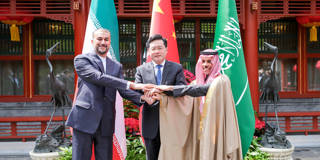Saudi Arabia’s turn toward China reflects its dissatisfaction with US policy. But while this is hardly the first time the Saudis have employed this approach to political bargaining, familiar does not mean harmless.
BISHKEK – Just a few years ago, it would have been practically unimaginable for Saudi Arabia, America’s longtime strategic partner, to join an economic and security organization led by China and Russia. Last month, however, the kingdom approved a memorandum of understanding granting it the status of “dialogue partner” in the Shanghai Cooperation Organization – the first step toward full membership.
The SCO’s foundations were laid in the 1980s, when the Soviet Union and China were attempting to navigate tensions over their shared border. After the Soviet Union’s dissolution, two parties became five: the People’s Republic of China, the Russian Federation, Kazakhstan, Kyrgyzstan, and Tajikistan. In 2001, the so-called Shanghai Five agreed that they should move beyond demarcation and demilitarization of borders to deepen regional cooperation, and the SCO was born.
Today, the SCO includes the Shanghai Five, plus India, Pakistan, and Uzbekistan, with Iran expected to join this year. The SCO also has nine dialogue partners – Armenia, Azerbaijan, Cambodia, Egypt, Nepal, Qatar, Sri Lanka, Turkey, and now Saudi Arabia – with five more countries having embarked on the same path. Three countries – Afghanistan, Belarus, and Mongolia – have observer status.

BISHKEK – Just a few years ago, it would have been practically unimaginable for Saudi Arabia, America’s longtime strategic partner, to join an economic and security organization led by China and Russia. Last month, however, the kingdom approved a memorandum of understanding granting it the status of “dialogue partner” in the Shanghai Cooperation Organization – the first step toward full membership.
The SCO’s foundations were laid in the 1980s, when the Soviet Union and China were attempting to navigate tensions over their shared border. After the Soviet Union’s dissolution, two parties became five: the People’s Republic of China, the Russian Federation, Kazakhstan, Kyrgyzstan, and Tajikistan. In 2001, the so-called Shanghai Five agreed that they should move beyond demarcation and demilitarization of borders to deepen regional cooperation, and the SCO was born.
Today, the SCO includes the Shanghai Five, plus India, Pakistan, and Uzbekistan, with Iran expected to join this year. The SCO also has nine dialogue partners – Armenia, Azerbaijan, Cambodia, Egypt, Nepal, Qatar, Sri Lanka, Turkey, and now Saudi Arabia – with five more countries having embarked on the same path. Three countries – Afghanistan, Belarus, and Mongolia – have observer status.